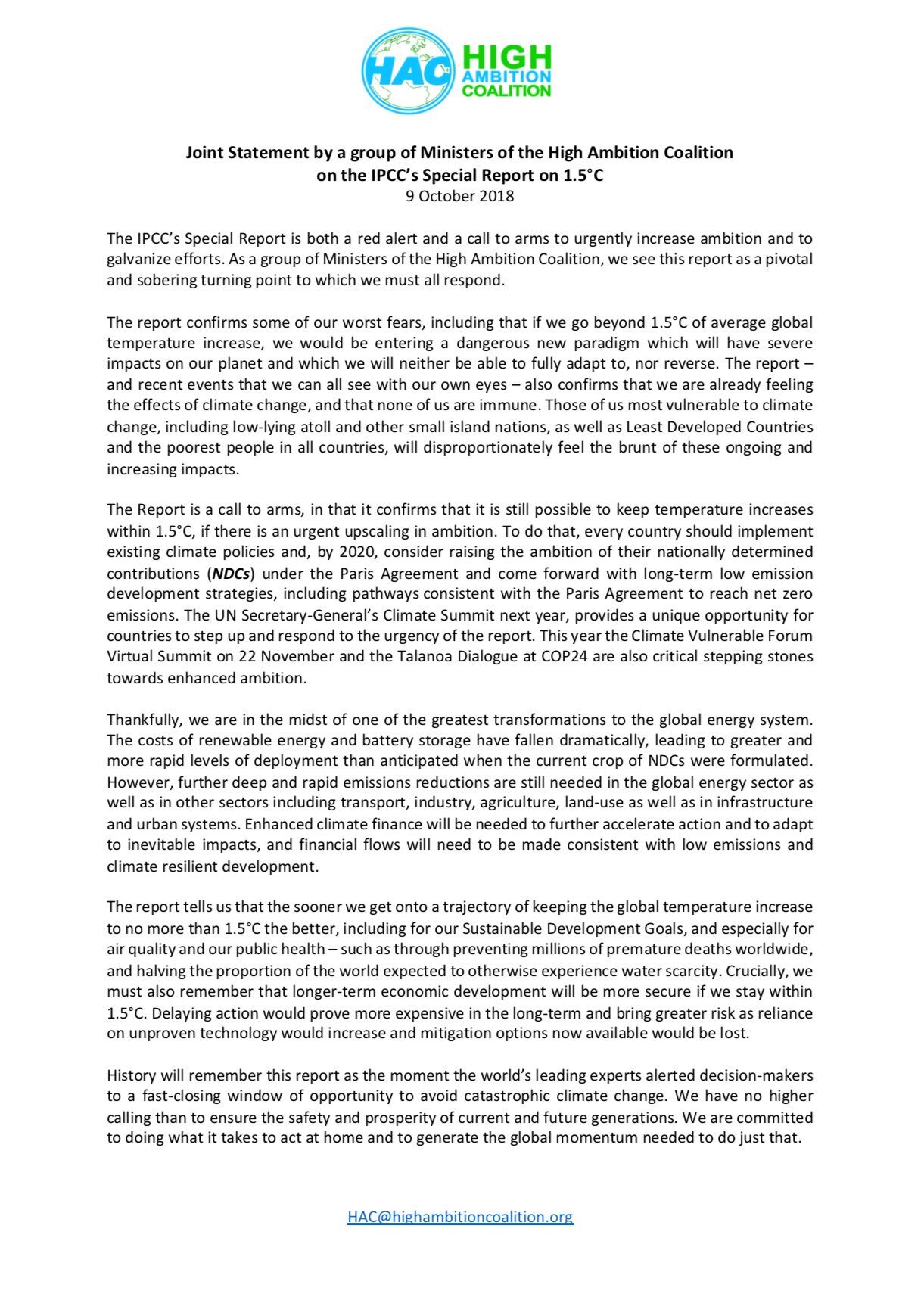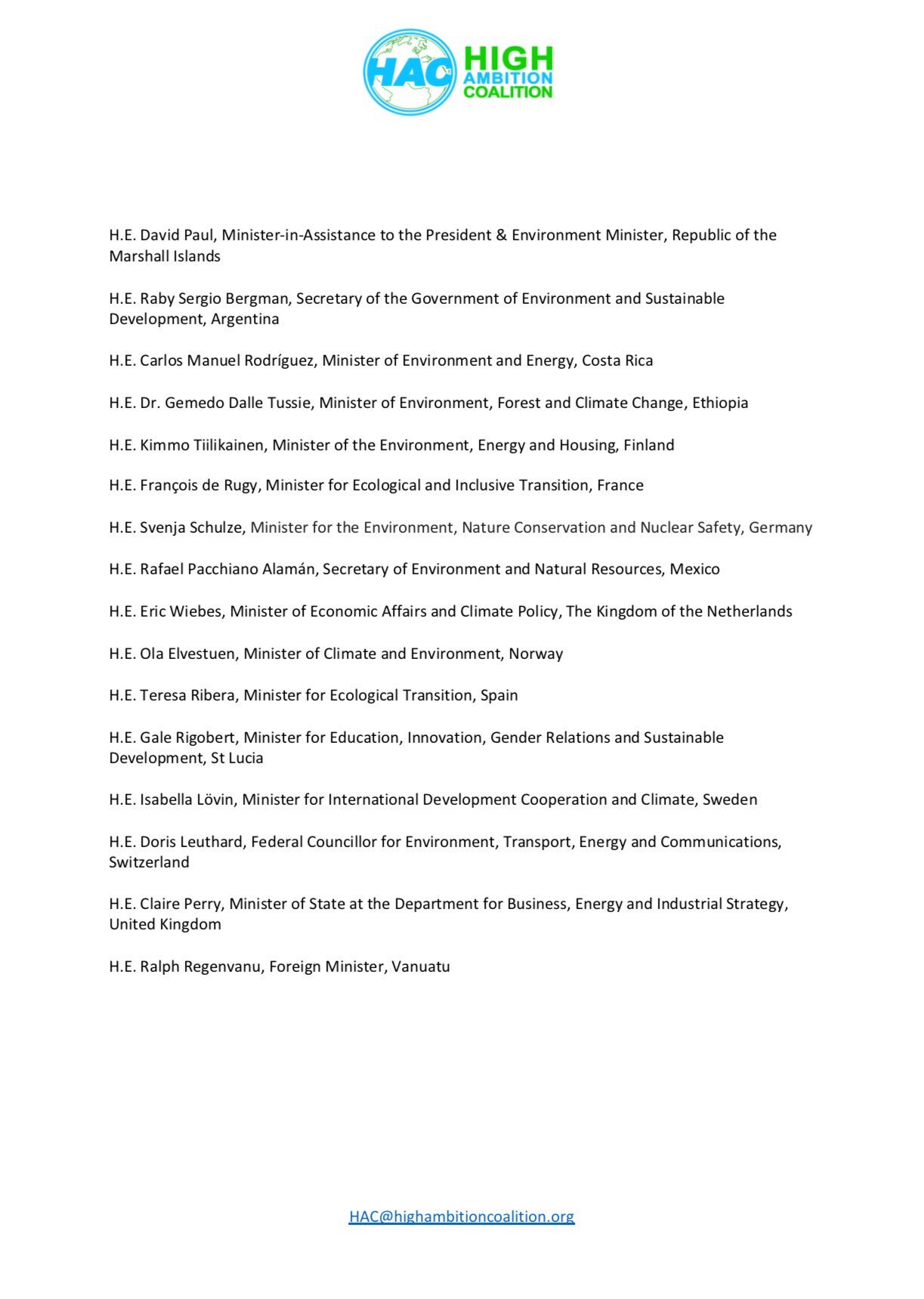Ministerial Statement on the IPCC’s Special Report on 1.5°C
The IPCC’s Special Report is both a red alert and a call to arms to urgently increase ambition and to galvanize efforts. As a group of Ministers of the High Ambition Coalition, we see this report as a pivotal and sobering turning point to which we must all respond.
The report confirms some of our worst fears, including that if we go beyond 1.5°C of average global temperature increase, we would be entering a dangerous new paradigm which will have severe impacts on our planet and which we will neither be able to fully adapt to, nor reverse. The report—and recent events that we can all see with our own eyes—also confirms that we are already feeling the effects of climate change, and that none of us are immune. Those of us most vulnerable to climate change, including low-lying atoll and other small island nations, as well as Least Developed Countries and the poorest people in all counties, will disproportionately feel the brunt of these ongoing and increasing impacts.
The Report is a call to arms, in that it confirms that it is still possible to keep temperature increases within 1.5°C, if there is an urgent upscaling in ambition. To do that, every country should implement existing climate policies and, by 2020, consider raising the ambition of their nationally determined contributions (NDCs) under the Paris Agreement and come forward with long-term low emission development strategies, including pathways consistent with the Paris Agreement o reach net zero emissions. The UN Secretary-General’s Climate Summit next year, provides a unique opportunity for countries to step up and respond to the urgency of the report. This year the Climate Vulnerable Forum Virtual Summit on 22 November and the Talanoa Dialogue at COP24 are also critical stepping stones towards enhanced ambition.
Thankfully, we are in the midst of one of the greatest transformations to the global energy system. The costs of renewable energy and battery storage have fallen dramatically, leading to greater and more rapid level of deployment than anticipated when the current crop of NCDs were formulated. However, further deep and rapid emissions reductions are still needed in the global energy sector as well as in other sectors including transport, industry, agriculture, land-use as well as in infrastructure and urban systems. Enhanced climate finance will be needed to further accelerate action and to adapt to inevitable impacts, and financial flows will need to be made consistent with low emissions and climate resilient development.
The report tells us that the sooner we get onto a trajectory of keeping the global temperature increase to no more than 1.5°C the better, including for our Sustainable Development Goals, and especially for air quality and our public health—such as through precenting millions of premature deaths worldwide, and halving the proportion of the world expected to otherwise experience water scarcity. Crucially, we must also remember that longer-term economic development will be more secure if we stay within 1.5°C. Delaying action would prove more expensive in the long-term and bring greater risk as reliance on unproven technology would increase and mitigation options now available would be lost.
History will remember this report as the moment the world’s leading experts alerted decision-makers to a fast-closing window of opportunity to avoid catastrophic climate change. We have no higher calling than to ensure the safety and prosperity of current and future generations. We are committed to doing what it takes to act at home and generate the global momentum needed to do just that.
H.E. David Paul, Minster-in-Assistance to the President & Environment Minster, Republic of the Marshall Islands
H.E. Raby Sergio Bergman, Secretary of the Government of Environment and Sustainable Development, Argentina
H.E. Carlos Manel Rodríguez, Minister of Environment and Energy, Costa Rica
H.E. Dr. Gemedo Dalle Tussie, Minister of Environment, Forest and Climate Change, Ethiopia
H.E. Kimmo Tiilikainen, Minster of the Environment, Energy and Housing, Finland
H.E. François de Rugy, Minister for Ecological and Inclusive Transition, France
H.E. Svenja Schulze, Minister for the Environment, Nature Conservation and Nuclear Safety, Germany
H.E. Rafael Pacchiano Alamán, Secretary of Environment and Natural Resources, Mexico
H.E. Eric Wiebes, Minister of Economic Affairs and Climate Policy, The Kingdom of the Netherlands
H.E. Ola Elvestuen, Minister of Climate and Environment, Norway
H.E. Teresa Ribera, Minister for Ecological Transition, Spain
H.E. Gale Rigobert, Minister for Education, Innovation, Gender Relations and Sustainable Development, St Lucia
H.E. Isabella Lövin, Minister for International Development Cooperation and Climate, Sweden
H.E. Doris Leuthard, Federal Councillor for Environment, Transport, Energy and Communications, Switzerland
H.E. Claire Perry, Minister of State at the Department for Business, Energy and Industrial Strategy, United Kingdom
H.E. Ralph Regenvanu, Foreign Minister, Vanuatu



